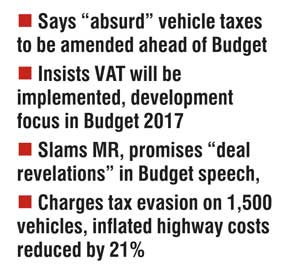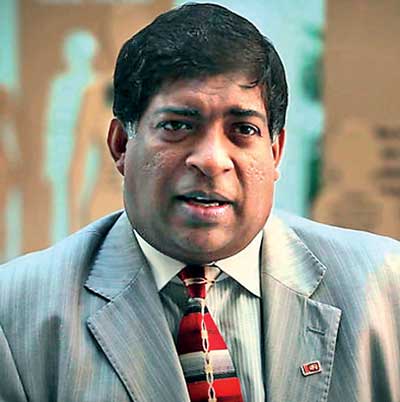Monday Feb 16, 2026
Monday Feb 16, 2026
Wednesday, 21 September 2016 00:01 - - {{hitsCtrl.values.hits}}
 Amended vehicle taxes, savings from development projects and growth plans were the focus of Finance Minister Ravi Karunanayake yesterday when he came out all guns blazing in Parliament criticising the former Government on its economic management and warning of “deal revelations” that would accompany the Budget 2017 presentation on 10 November.
Amended vehicle taxes, savings from development projects and growth plans were the focus of Finance Minister Ravi Karunanayake yesterday when he came out all guns blazing in Parliament criticising the former Government on its economic management and warning of “deal revelations” that would accompany the Budget 2017 presentation on 10 November.
Finance Minister Ravi Karunanayake called on all Parliamentarians to support the proposed VAT hike, emphasising that it would be implemented despite resistance from the Joint Opposition.
He also insisted that the Government would move forward with a balanced economic plan, which would be moved on 10 November when he delivers the Budget Speech.
Ahead of the Budget, vehicle taxes will be amended, the Finance Minister said, heavily criticising an “absurd” tax system that in his view gives space to evade taxation by undervaluing the vehicle. The new system aims to implement tax based on engine capacity, which he noted would reduce corruption and increase transparency.
 “We have had an absurd vehicle tax for years. We are informed Government agents and officers have taken undue benefits making use of that tax system. All this time the value of the car was taken into consideration to decide the tax component. We have decided to tax according to the engine capacity. We are now in the process of stopping the under valuations.
“We have had an absurd vehicle tax for years. We are informed Government agents and officers have taken undue benefits making use of that tax system. All this time the value of the car was taken into consideration to decide the tax component. We have decided to tax according to the engine capacity. We are now in the process of stopping the under valuations.
We are yet to reach satisfactory levels. The undervalued vehicle imports, which was 80%, has now come down by 20%. We need a 100% foolproof system and a transparent mechanism in place. We have noticed decisions taken exceeding the international valuation systems and formalities.”
According to the Minister, 1,500 vehicles were imported during the previous Government’s tenure to evade taxes. He called for support of the new system and feedback to close loopholes, especially in identifying new cars that are imported as old ones. Karunanayake stressed that excessive vehicle imports would be discouraged until sufficient infrastructure was in place.
“I know our new system will not be perfect but we need your feedback to improve it. The value difference between a European vehicle and a Japanese vehicle will also be considered. When you import a two-year used car we consider it as a new vehicle for the taxes. Sometimes, even 10-day-old vehicles are shipped as used cars. So we are unable to make use of the depreciation in this system,” he added.
Expanding the taxes to other areas the Government has increased its excise tax income severalfold. “During the previous Government you were able to get Rs. 40 billion from excise tax. We have collected Rs.150 billion as excise tax. So, many come forward because they have lost their illegitimate income,” the Finance Minister charged.
“One of your members imported a vehicle exceeding the engine capacity limitations. Now he is highlighting this vehicle as an import done under his privileges. Wasantha Samarasighe claims we have allowed to import Benz cars using tractor permits. This is not true. We challenge the JVP to prove such allegations. Where are those Lamborghini cars? These cars were brought here making use of the Carne Certificate to export after one year of use in Sri Lanka.”
Karunanayake also slammed former President Mahinda Rajapaksa, who in a statement on Monday called on the Government to retract the VAT increase. The Finance Minister reiterated that the increase in public revenue was necessary to repay loans that were taken during the tenure of the Rajapaksa regime. The current administration will introduce a sustainable economic plan as part of the Budget for 2017 the Minister went on to say.
“Why request us to reduce the VAT? He destroyed the economy and now wants us to limit the VAT. What happened during his era led to these issues. Let’s take the Sooriyawewa stadium. What has happened to the excess money spent? We have reduced the highway construction costs by 21%. We will show how best we could develop the nation from the next Budget on 10 November. We need to have a national policy on income. This will allow us to limit our expenses. We need to prioritise our needs. What we need is a balanced economy,” he said. (AH)